Editor’s note: All images featured in this chapter are taken from Dutch historical sources.
My Mother Dies
Mother was deaf and never went to church. We had to attend services however not that she was so religious but mostly because we received sixty cents a week and a loaf of bread from the diaconate.
When I was nearly 10 years old, mother died. She had literally worn herself out in order to provide for us. We belonged to the Nederlands Hervormde Kerk, but although the church was rich, we got next to nothing for our support from it. I remember going for a season or two to what I believe was a Mission Sunday School of the Christian Reformed Church. At Christmas, I got besides candy, an orange, woolen socks and underwear and still something else, what, I forgot. When I came home mother was very pleased and thankful and said something in favor of the church – those that separated from the State church of the Netherlands in 1834.
I still remember mother’s funeral. Everything of necessity was very simple. As far as I remember mother wore only a white shirt without anything fancy. The casket was a square box made of common ordinary wood, not even lined in the least. We could not afford any better I suppose. The cemetery was outside the city and I remember although I was very sorry mother had died, I enjoyed the ride in the coach. It stopped by the gate and they carried the casket, covered with a black cloth, to the grave. There was some kind of a ceremony but I remember as only the words “Dust thou art and to dust thou shalt return”, and we were told according to custom to throw a shovel of dirt on the casket. Then we went home again. I did not at that time realize what it meant to me.
At Neerbosch Orphanage in Holland
Shortly after mother was buried it was decided that my sister would get a permanent place to do housework and my brother and I were to go to an orphans’ home. My sister took her leave from us and kissed us goodbye for they had found a place for her in Amsterdam, with a Lutheran family, a retired printer and publisher with two daughters, both being nearing middle age.
My brother and I were to go to Neerbosch an institution for children somewhere near Nijmegen in the Province of Gelderland. This orphanage was not dependent upon any church or the State. It was started in faith by the founder and had expanded rapidly from the beginning. When we came there, there were close to a thousand children, both boys and girls.
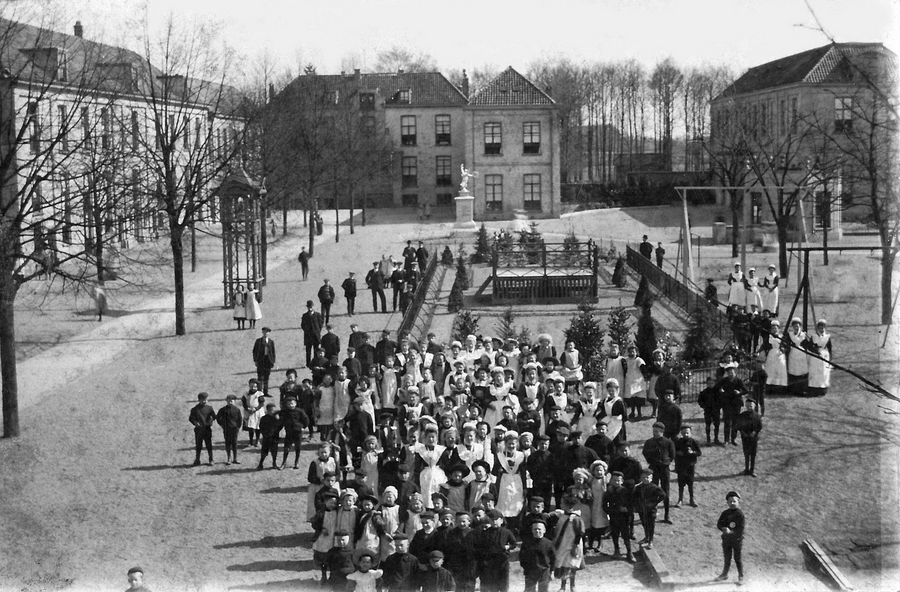
When we left Gorkum a lady of the church took us over there and I remember that we were received in the waiting room. At that time it looked all very good to us. A certain person, who later proved to be one that had the care of some two hundred boys from eight to twelve years of age, showed us around. There were at that time some thirty odd buildings comprising the institution. When we had been over the grounds, the lady who had also accompanied us from Gorkum, lingered awhile and spoke nice words to us to be good boys, etc., kissed us and said goodbye. We were now in the orphan’s home. It was a good place. We got good food, good beds and good treatment, but we had to be good. Everything had to be just so, on time, and on turn and by numbers, like it is in the army. There was also a former army officer, who took care of the boys at times but was studying for catechism teacher. A day or two later when I did not see my brothers, I hunted for him and found him behind one of the buildings with tears in his eyes and I asked him what was the matter. Well, he experienced the same thing that I did. We both very much missed our humble home, and above all….our mother. We could always go to her with our griefs, likes and dislikes, but she was gone forever and no one else would and could take her place.
Yes, that old little home, including that poor existence which was our portion for nearly 8 years, we missed very much and we would fain have returned to that previous life if we could.
After a while we hardened to the life in the orphan’s home. Boys are boys, and in that home among the boys, one had to take care of himself. As a rule they picked on new comers and we were no exception. We had to learn to fight and to stand up for our rights, and of necessity were in fights, and at first got licked. Slowly on however, we held our own. We soon learned that no one would ever go to a superior for redress. That would not do any good. No one would tell on another. We would rather take a licking with a stick that hurt good and plenty, than to give away the other fellows. There was loyalty among the boys. I don’t know as to the girls – loyalty. If you did overstep the institutional rules or fail to observe these rules, they would not “tell-tale” on each other. If anyone failed to go to church or skipped a meal or had stolen something to fill his stomach, or managed to get a double portion somehow, they would never tell and they would never know one had seen anything. The religion in the orphans’ home was of the evangelical kind. The founder was a man of faith and officially he and the institution belonged to the state Church, the Nederlands Hervormde Kerk. However in this church there was freedom of preaching and teaching. Modernism as well as strict orthodox or evangelical preaching was allowed to be preached. The institution had a church building of its own. It was entirely erected by their boys under supervision of the head carpenter. It looked very neat and had a gallery all the way around and seated about one thousand.
From the home of the founder a 10’ wide sidewalk led to the church building. The church itself stood on a terrace. In the winter we were wont to slide down its terrace on our wooden shoes. How we enjoyed that! There was a basement under the entire church. This basement was used for storage room to take care of the provisions for the winter. There were also two fireplaces or cooking stoves in a separate room in the basement. The institution was not very far from the Rhine River and in the past the dikes had broken and had caused an inundation and this might happen again. Well, the church being built on a terrace would provide a place of safety for a while, and then those stoves would come in handy.
Most of us children did not like to go to church. During the time of the year when it was not too cold, we had to attend “reading” every morning from 7:30 to 8:30 in church. That was for us children 8-12 years that did not go to work during the week days. On Sunday everybody attended this “reading”, except the employed personnel and those that had to take care of breakfast. There was always reading of the Bible at meal time, three times a day with a word of prayer before and after. All children followed the custom to kneel down before we went to sleep or, rather, to bed, and when we arose in the morning. The boys of 16 to 20 or above always ended the day by singing: [click here for the melody – ed.] [1]
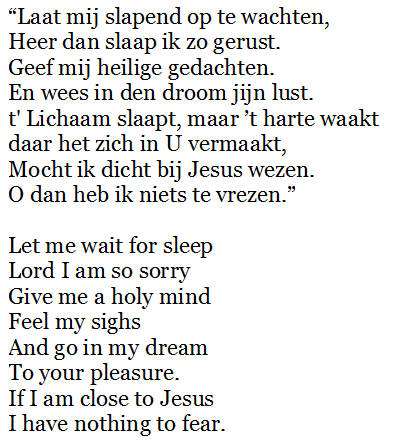
The attendant was a kind hearted gentleman, who never missed the right pitch when leading the singing. He also was the “reader” in church on Sunday morning at 7:30. He knew how to get and to keep our attention and was well liked.
On Thursday & Saturday evenings we had prayer meeting and on Sunday, after breakfast at 10:00 we went to church and again at 4:30 in the evening. In the afternoon at about 2:00 all the boys of like ages, had to take a walk under supervision. The Sunday was usually ended by singing hymns and psalms. When our clothes were new or nearly so, these walks would be long. On one occasion, when we marched through a neighboring village, a certain estate owner gave us boys – that happened when I was nearly 12 years old – all a drink of sweet wine mixed with water. It was a hot day and we were all very thirsty and enjoyed the drink very much. At another time we were allowed to rest, take off our shoes and stockings to wade in a shallow, sandy creek. We were always glad to be back home again.
We wore wooden shoes during week days but on Sunday they were of leather. No lining in them but good and strong. When in winter the ice was strong we were sometimes allowed to have our Sunday shoes and go skating. Otherwise we would either skate with our wooden shoes on or do it on stocking feet. There was a shallow pool, we called it the “vyves” (view) and in the spring when the ice would break up we would run from one piece of ice onto the others & across, somewhat on the order of Eliza of Uncle Tom’s cabin. One boy was very thin, but had big feet, and big wooden shoes. So we all kidded him to go across first saying he would float on his wooden shoes anyway, but he refused to do so. Another boy attempted more daring to do it but slipped & went waist deep into the icy and muddy water. That boy was me. I did not dare to ask for dry clothes, for that meant a whipping with that stick that hurt plenty. I remember I suffered and felt pretty cold, but I lived through it and did not take sick, although my clothes froze like boards to my legs.
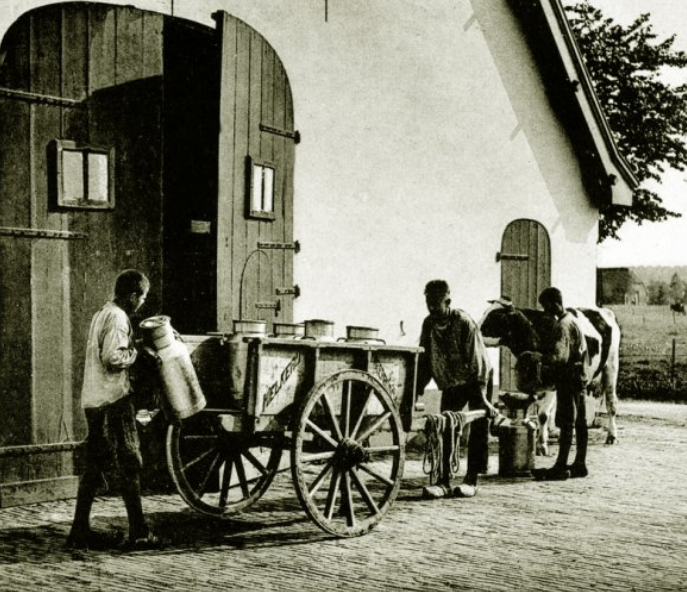
When I was about 11 years old, the officer who had charge of us, about 200 boys from 8 – 12 years of age, appointed me as his personal errand boy. Every morning I had to polish his shoes and sweep his room; I also had to get a liter and a half of milk from a nearby farmer. This milk was for his only son whose mother died when he was born. As a baby he was taken into the institution’s hospital where I had to deliver the milk in the morning. There were more little children and also those that were really sick. Every week I had to go to the nearest town and do errands there. I always took a basket along. It was an hour’s walk, six kilometers. That is as fast as soldiers walk in the Netherlands. I made it a point to walk that distance both ways in two hours. I usually whistled my highest tunes on the way. Mostly hymns we had learned in school. About this time I joined a class to learn music and singing and learned to play a brass instrument. One day, on the supervisor’s birthday, I made the trip 3 times, walking about in all 40 kilometers. On his birthday, his boys, 200 plus got a well-known and favorite cookie. Many times I did little errands for other boys in town, for which I received a consideration. I was envied by others that I earned every week ten cents in his service. At times I would buy for someone 10 or 15 cents worth of cheap baloney. My share would be a slice of it, or at another instance I would take a pocket knife along for a quarter, then a cent or two would be my reward.
_________________________________
[1] Dutch lyrics revised by editor. In the manuscript they are given as follows:
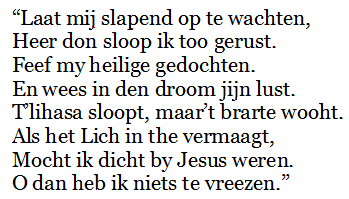

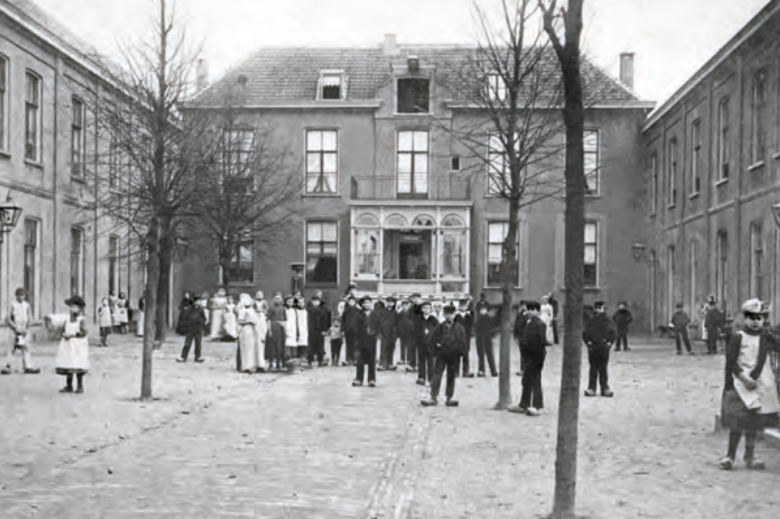

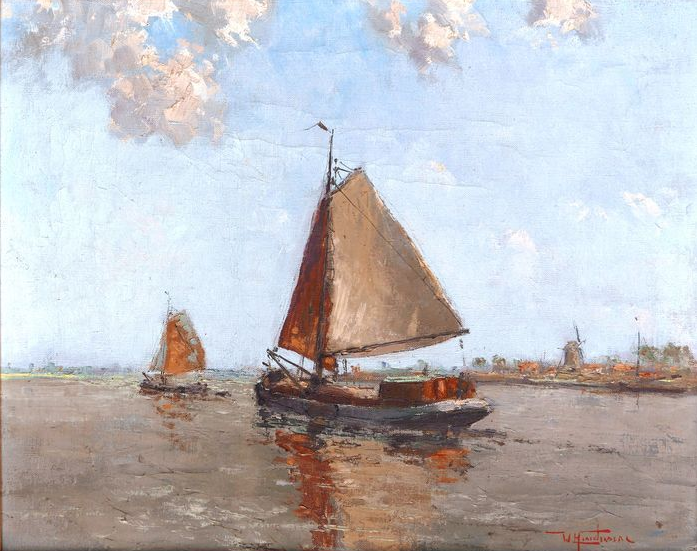


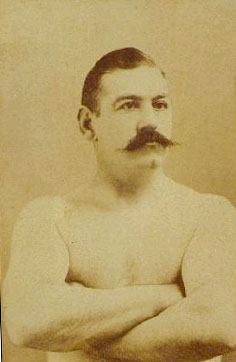

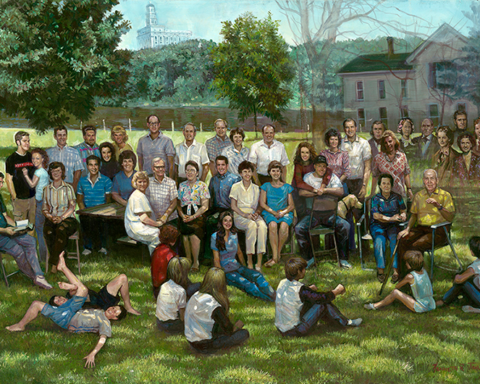

5
5